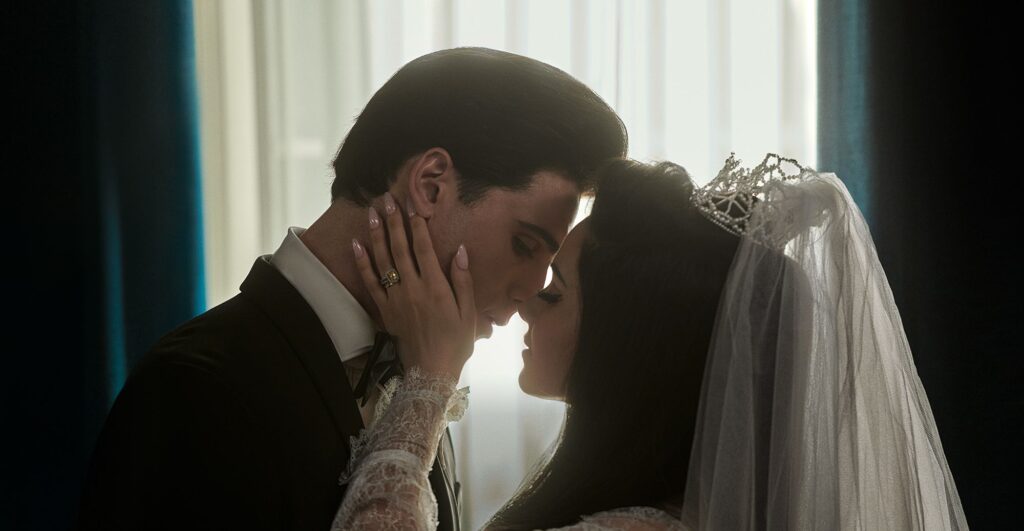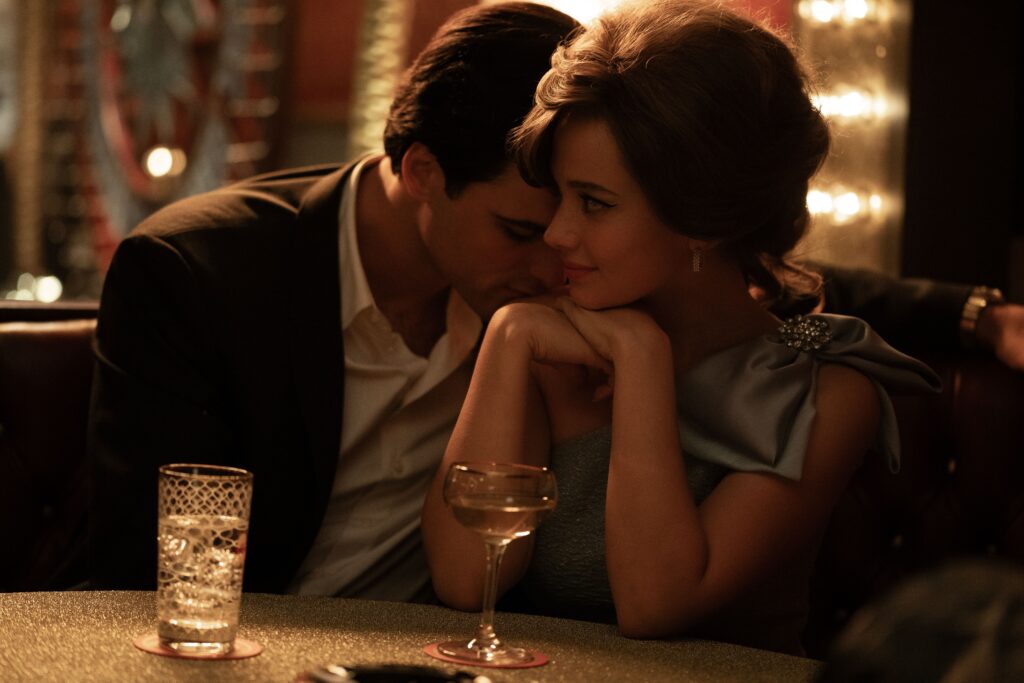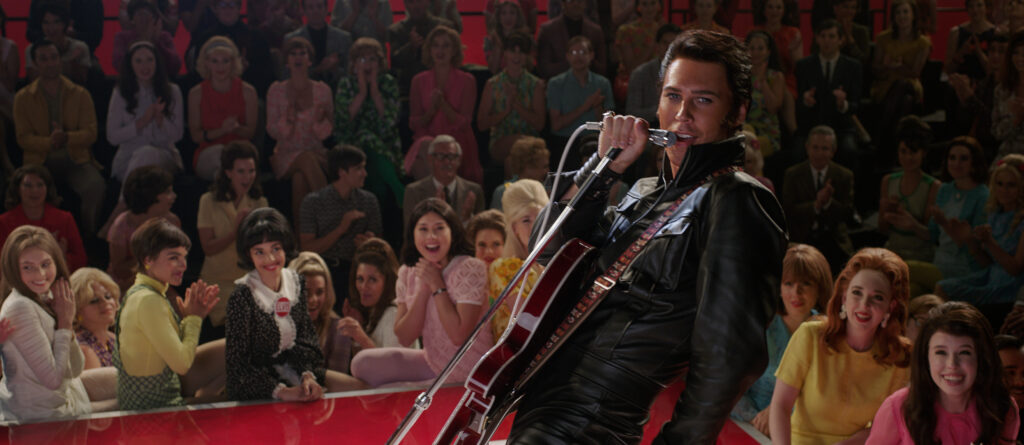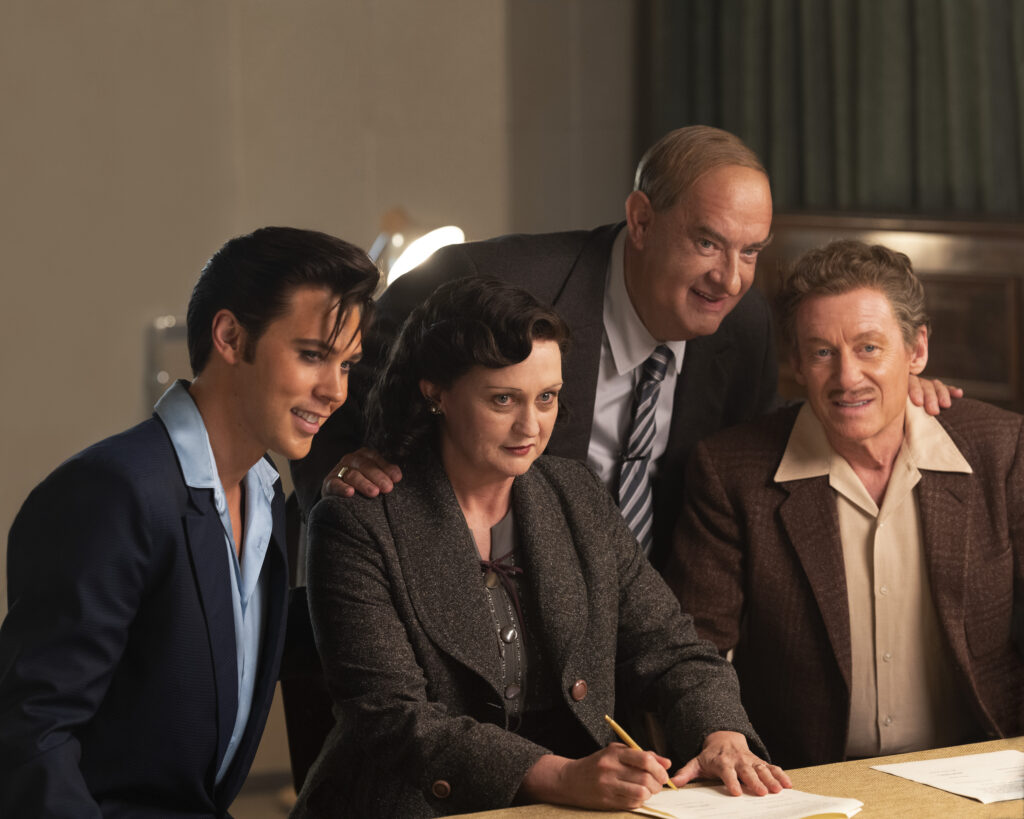October 6, 2023
by Carla Hay

Directed by Sofia Coppola
Culture Representation: Taking place in the United States and in Germany, from 1959 to 1973, the dramatic film “Priscilla” (based on Priscilla Presley’s memoir “Elvis and Me”) features a predominantly white cast of characters (with a few African Americans) representing the working-class, middle-class and wealthy.
Culture Clash: At 14 years old, Priscilla Beaulieu is courted by 24-year-old superstar Elvis Presley, and they get married when she is 21, but their relationship is plagued by his drug addiction, infidelity, and controlling tendencies.
Culture Audience: “Priscilla” will appeal primarily to people who are fans of the Elvis Presley family and people who like artfully cinematic versions of memoirs.

With quiet observations and volatile emotions, the biopic “Priscilla” compellingly shows the doomed relationship of Elvis and Priscilla Presley, who had a love affair that was tender and toxic. Cailee Spaeny and Jacob Elordi give riveting performances as this ill-fated couple. “Priscilla” is based on Priscilla Presley’s 1985 memoir “Elvis and Me,” which at the time revealed many candid details about how suffocating this relationship was for her, even during the happy times, and why she finally had to break free and start a new life.
Written and directed by Sofia Coppola, “Priscilla” has the blessing of Priscilla Presley, who was married to Elvis from 1967 to 1973. (Priscilla is one of the executive producers of the movie.) Elvis died of a heart attack in 1977, when he was 42. “Priscilla” had its world premiere at the 2023 Venice International Film Festival, where Spaeny won the prize for Best Actress. “Priscilla” had its North American premiere at the 2023 New York Film Festival. The movie takes place from 1959 to 1973 (when Priscilla was 14 years old to 28 years old), with Spaeny skillfully portraying Priscilla in every scene.
Most people who are fans of Elvis already know the story of how Elvis and Priscilla met in 1959, at a party at Elvis’ rented home in Bad Nauheim, Germany. (“Priscilla” was actually filmed in Toronto.) The movie shows how Priscilla (born in New York City, raised in Texas) was living in Germany at the time with her mother Ann Beaulieu (played by Dagmara Dominczyk) and stepfather Paul Beaulieu (played by Ari Cohen), because Paul was a captain in the U.S. Air Force, and the family was stationed at a military base in Germany. At the time, Elvis was the biggest music superstar in the world, and he had been drafted into the U.S. Army.
Priscilla’s birth name was Priscilla Wagner. Her biological father, James Frederick Wagner, who was a pilot in the U.S. Navy, died in a plane crash when Priscilla was 6 months old. She was adopted by Paul Beaulieu after he married Priscilla’s mother. Priscilla’s maiden surname was then changed to Beaulieu. In real life, Priscilla had five younger half-siblings, but these siblings are barely in the movie. Everything is completely told from Priscilla’s perspective, from the beginning of her relationship with Elvis to their separation that eventually led to their 1973 divorce.
At the time that Elvis (a boisterous extrovert) and Priscilla (a quiet introvert) met, he was 24, and she was 14. What many movies and TV shows about Elvis often gloss over or try to excuse is the predatory way he pursued this child to go out on dates with him. Although Priscilla claims that Elvis always asked her parents’ permission to go out on dates with her when she was underage, the fact remains that their relationship while she was an underage teen was very inappropriate. “Priscilla” shows in no uncertain terms that the relationship has all the signs of a girl and her parents being “groomed” so that she could eventually be controlled and manipulated by an older lover. In this case, the older lover just happened to be rich and famous.
In “Priscilla,” this imbalance of power is shown right from the start. Elvis’ friend Terry West (played by Luke Humphrey), a military man in charge of booking the base’s entertainment, is the one who actually invited Priscilla to Elvis’ house party. Terry meets Priscilla when he sees Priscilla by herself at a diner on the military base, and he compliments her on how pretty she is before he invites her to Elvis’ party. It makes you wonder if Terry was asked by Elvis to specifically target underage teenage girls to “hang out” with Elvis at these parties, Priscilla’s parents certainly weren’t invited to this party.
The first instinct of Priscilla’s parents is to not allow her to go to the party. Terry assures Ann and Paul that Terry and his wife Carol West (played by Deanna Jarvis) will be chaperoning Priscilla the entire time that Priscilla is at the party. Of course, these chaperones aren’t with Priscilla the entire time, because Priscilla and Elvis have moments when they are alone together. In the movie, when Elvis finds out that Priscilla is only in ninth grade, he says to her, “You’re just a baby.”
Priscilla is naturally flattered by the attention, because she was already a fan of Elvis before they met each other. In one of their early conversations, she tells him that her favorite song is Elvis’ “Heartbreak Hotel.” Elvis likes what he sees and hears when he’s with Priscilla, who is starstruck and overwhelmed by being in Elvis’ presence. Priscilla will eventually see Elvis’ abusive and controlling side, including his nasty temper and his demands that her physical appearance be exactly how he dictates her to look. As Priscilla said in “Elvis and Me” about Elvis: “He was truly a master at manipulating people.”
By the time Priscilla is asked to go on a third date with Elvis, Paul requires that Elvis meet Paul and Ann in person first. Paul is the more skeptical and wary parent, who questions Elvis on why Elvis is pursuing underage Priscilla when Elvis could date women. Elvis tries to spin it as “companion” interest instead of a sexual interest, by telling Paul that he enjoys talking to Priscilla and that she’s “mature” for her age. Elvis also plays the sympathy card, by telling Ann and Paul that Priscilla has been helping him get over the death of his beloved mother, Gladys, who died of a heart attack in 1958. Elvis uses his fame and charm to eventually convince Ann and Paul that his only intentions are to take care of Priscilla like a young friend.
Of course, the relationship became more than friendly and not very innocent. The movie shows Elvis is the one who initiates the first kiss that he and Priscilla have together. And early on in the relationship, he introduces Priscilla to taking pills (uppers such as Dexedrine and downers such as Placidyl) that he was frequently ingesting as a way to cope with his hectic lifestyle. “Priscilla” does not try to excuse the fact that Elvis was knowingly drugging an underage person who didn’t have a prescription for those pills.
As depicted in the movie, Priscilla has no interest or curiosity in taking the pills the first time that Elvis orders her to take these pills. She only does it to please him. It eventually became a pattern in the relationship between Elvis and Priscilla. The movie implies that Priscilla eventually gets hooked on the pills, but her pill habit wasn’t severe enough for her to seek medical help. In “Elvis and Me,” Priscilla said that while she was married to Elvis, she eventually quit taking these types of pills on her own, but Elvis never quit.
In 1960, after Elvis left active duty in the U.S. Army, he went back to the United States. He stopped contacting Priscilla for all of 1960 and a great deal of 1961, while Priscilla pined for him and showed no interest in dating boys her own age. She was also aware of Elvis’ very busy love life that was covered in the media. This type of heartbreaking infatuation is shown with accurate clarity in “Priscilla,” which does a very good job of depicting how the lines can be blurred between fan worship and an unhealthy obsession. Priscilla believes that her connection to Elvis was real in the short time that they spent together, so she’s deeply hurt and confused over why he chooses not to keep in touch with her.
And so, in 1961, when Elvis calls Priscilla out of the blue to pick up right where they left off in their relationship, it’s no wonder that lovelorn Priscilla jumps at the chance. Now older and more assertive (but still under 18), Priscilla threatens to run away to wherever Elvis is if her parents won’t give her permission. Elvis summons Priscilla to Memphis, Tennessee, to visit him on a regular basis at his famous Graceland mansion.
By 1963, when she is 18 years old, Elvis has persuaded Priscilla to live with him at Graceland. Her parents are convinced it will be safe because Graceland is also the home of some of Elvis’ relatives, including Elvis’ father/business manager Vernon Presley (played by Tim Post) and Vernon’s mother Dodger Presley (played by Lynne Griffin), whose real name was Minnie Mae Hood Presley. While she’s in high school, Priscilla’s true relationship with Elvis isn’t officially confirmed to the media because of the scandal it would’ve created.
While out on dates with Elvis, she was presented as Elvis’ close friend, but most people were skeptical that the relationship was strictly platonic. In “Elvis and Me,” Priscilla also mentioned that Elvis used his money and clout to keep many of their dates secretive. For example, he would often rent out an entire movie theater after-hours for him, Priscilla and anyone else who was invited to watch his choice of movies.
The scenes where the adult Elvis is “seducing” underage Priscilla are supposed to be uncomfortable to watch, especially for people who don’t want the words “statutory rape” to be associated with Elvis. In Tennessee, 18 years old is the minimum age of consent to legally have sexual relations with an adult. This was also Tennessee law in the 1960s.
There’s a scene in “Priscilla” where adult Elvis tells underage Priscilla that he won’t have sexual intercourse with her, but “we can do other things.” In “Elvis and Me,” Priscilla admitted that she and Elvis started having sexual relations (which she called “lovemaking”) when she was 16. She claims that they didn’t have full sexual intercourse until their wedding night, when she was 21. Priscilla and Elvis got married on May 1, 1967, less than two weeks before Priscilla’s 22nd birthday.
“Priscilla” will get inevitable comparisons to the Oscar-nominated 2022 biopic “Elvis” (directed and co-written by Baz Luhrmann), but these two movies couldn’t be more different from each other. The bombastic spectacle “Elvis” was sanctioned by Elvis Presley Enterprises and is chock full of Elvis songs and dazzling performance scenes, but the movie doesn’t show Priscilla as anything but a side character, and the movie blocks out any references to legal issues regarding Elvis being sexually involved with an underage girl. The “Elvis” movie does not show how (according to Priscilla) Elvis coldly announced to her that he wanted a trial separation, when she was pregnant with daughter Lisa Marie in late 1967. The separation ended before Lisa Marie was born in February 1968.
“Priscilla,” which has a much lower budget than “Elvis,” is a quieter and more understated character study that is a more accurate depiction of what happened in the relationship between Elvis and Priscilla. Viewers should not expect to see big scenes of Elvis performing his songs in “Priscilla.” There are no Elvis songs in the “Priscilla” movie and only a few brief scenes of him performing on stage. Also noticeably absent in “Priscilla” is Elvis’ domineering manager Colonel Tom Parker, who is the narrator and one of the main characters in 2022’s “Elvis.”
One of the most effective things about “Priscilla” is how it depicts abusive relationships as often starting off as “fairy tale” type of romances. But there are usually warning signs. Early on in their dating relationship, Elvis forbids Priscilla from taking a part-time job at a clothing boutique, by telling her that she has to make this choice of what she wants in her life: “It’s either me or a career.” Long before Elvis and Priscilla are married, he expects her to be at his beck and call, while he doesn’t have to answer to her about any of his activities or life decisions. Elvis gets very angry when Priscilla asks questions about what he does when he’s away from her.
And when there are obvious signs that Elvis is cheating on Priscilla (his “Viva Las Vegas” co-star Ann-Margret is mentioned as Priscilla’s biggest rival), he tries to make Priscilla sound paranoid or imagining things when she brings up her infidelity suspicions to him. When the couple’s arguments get physical (there’s a scene where Elvis throws a chair at Priscilla, but the chair narrowly misses her; another scene shows Elvis harshly shoving Priscilla), Elvis does the typical abuser “love bombing” of making profuse apologies and promising that the abuse will never happen again. Elvis is shown as someone who was unpredictable, with a temper that could go from one extreme to another in a matter of minutes. There are enough good times to convince Priscilla to stay in the relationship longer than she should have, but the abuse never really leaves the relationship.
“Priscilla” has many scenes in the movie that are taken directly from “Elvis and Me,” often using some of the same lines of dialogue that are quoted in the book. For example, the movie recreates the section in the book where teenage Priscilla is desperate to get a good grade on a math test, in order to graduate from high school. And so, she convinces the straight-A female student sitting next her during the test to let Priscilla copy the answers on her test, with the implied promise that the other student will be invited to one of Elvis’ parties as a reward.
One of the many other experiences described in the “Elvis and Me” book that’s recreated in the “Priscilla” movie is when underage Priscilla visits Elvis at Graceland, sometime in 1961, when they had rekindled their dating relationship. During this visit, she is once again not accompanied by her parents when spending time with Elvis. Elvis tells Priscilla to take some pills. She goes into a deep sleep that she thinks lasts for a few hours. When she finally wakes up from her groggy stupor, Elvis tells her she’s been barely conscious for two days, and he refused to take her to a hospital. This is the type of disturbing experience that isn’t in most movies or TV shows about Elvis.
During the marriage of Priscilla and Elvis, they maintain a home at Graceland; at a ranch in Horn Lake, Mississippi; and at a mansion in the Los Angeles area. Elvis and Priscilla also spend a lot of time in Las Vegas, where Elvis had a concert residency at Las Vegas International Hotel, from 1969 to 1976. (The hotel’s name is now Westgate Las Vegas Resort & Casino.) Elvis and Priscilla share a fondness for certain animals as pets, particularly dogs and horses. A West Highland White Terrier (a gift from Elvis to Priscilla) becomes Priscilla’s constant companion in many scenes. In real life, this dog was a white poodle named Honey.
Elvis’ self-titled 1968 concert special on NBC (also known as the Elvis comeback special) is depicted as a triumphant and happy experience that Elvis and Priscilla watched on TV with members of their inner circle. Elvis would also host several parties and musical jam sessions. Unlike the 2022 “Elvis” movie, “Priscilla” does not have several depictions of other celebrities who knew Elvis. As shown in “Priscilla,” any good times that Elvis and Priscilla had also came with bad times that were the eventual undoing of this marriage.
In subtle and not-so-subtle ways, “Priscilla” shows that the glamorous sides of fame and fortune—such as shopping sprees, high-priced gifts and lavish trips—were just superficial things that did not impact the marriage of Elvis and Priscilla nearly as much as the abuse and disrespect that she suffered during the marriage. As seen in the movie, Priscilla can come home with shopping bags of expensive items, but when she’s at home, she goes back to being an oppressed wife whose husband makes restrictive demands on her or ignores her while he’s away enjoying the company of other women.
Priscilla is also constantly reminded that Elvis has more power than she ever will. When she is a teenage student, he visits the Catholic high school where Priscilla attends after she moved to Memphis. Some of the school’s nuns are star-struck and act like giddy schoolgirls when they ask to take photos with Elvis. When she is a married adult, Elvis refuses to let Priscilla to get a job or have any career interests. Long before they are married, he tells her as an underage child that her life has to revolve around him, in order for him to really love her and be in a relationship with her.
“Priscilla” also shows the painful loneliness that often comes with dating a busy celebrity. While in high school, Priscilla doesn’t have many friends. She’s considered “different” or “unapproachable” because she’s dating Elvis. She’s also predictably the subject of a lot of gossip and is told by Elvis not to mingle with people who could spread information about their relationship. Vernon also won’t allow Priscilla to bring any visitors to Graceland, where she was living during her last year in high school in 1963.
As an adult, Priscilla is frequently left alone while Elvis is touring or working on a movie. Elvis would often forbid her to visit him where he was working. And if she was allowed to visit him, she could only stay for a very short period of time. Priscilla often had to find out what Elvis was doing with other women in his free time by hearing about or seeing these antics in the media.
“Priscilla” shows that Priscilla has some female friends, but those friendships are briefly depicted in the movie as social friends, not close confidantes who know all the details about Priscilla’s misery in her marriage. It’s one of the few areas of the movie that is in direct contrast to Priscilla’s account in her “Elvis and Me” memoir. In the book, Priscilla details her close female friendships, particularly with Joan Esposito, the first wife of Elvis’ longtime tour manager Joe Esposito.
And sometimes, the loneliness that Priscilla experienced was when Elvis was physically there with her but emotionally far apart. The movie portrays Elvis’ mid-1960s obsession with various religions and philosophies in his quest to find the true meaning of life. Elvis’ hairstylist Larry (played R Austin Ball), based on the real Larry Geller, becomes a self-appointed spiritual guru for Elvis. Larry is the one encourages Elvis and Priscilla to take LSD for the first time. (In “Elvis and Me,” Priscilla said she and Elvis only took LSD once when they were a couple.) This “acid trip” is depicted in the movie, but not quite in the way that it’s described in “Elvis and Me.”
The movie portrays Priscilla’s eventual discontent over Elvis’ spiritual philosophy activities, because she felt it was ruining their marriage. In bed, she would try to be sexually intimate with him, but he would demand that she listen to him while he read spiritual and philosophical books out loud to her. By the mid-1960s, he was inviting people to have Bible studies at their Bel Air home. He would lead these Bible studies, which would last for hours per session. All the Bible study guests were young, adoring females, who would mutually flirt with Elvis, while Priscilla was usually in the same room.
Elvis’ notorious all-male entourage, nicknamed the Memphis Mafia, is depicted as mostly carousing “yes men.” Elvis and the Memphis Mafia leer and gawk at Priscilla when she is forced to make herself look sexy for them, such as trying on and modeling dresses for Elvis and his Memphis Mafia, while they give their opinions on how she looks. This judgmental leering has a sleazy factor when you consider that Priscilla is an underage teen in these scenes.
After Elvis and Priscilla become parents to daughter Lisa Marie, he spends even less time with his family. (Raine Monroe Boland as the role of Lisa Marie at age 3. Emily Mitchell has the role of Lisa Marie at age 5.) The smiling Presley family portraits during this time often masked a marriage that was fracturing and would eventually permanently break.
“Priscilla” doesn’t make Priscilla look saintly, but the movie could have been more honest in showing that Elvis wasn’t the only one who was unfaithful in their marriage. In “Elvis and Me,” Priscilla admitted she had an affair with her karate instructor Mike Stone in 1972, before she made the decision to leave Elvis. The “Priscilla” movie hints that Mike Stone (played by Evan Annisette) and Priscilla were sexually intimate, but the movie has no outright depiction or admission of this extramarital affair.
Overall, writer/director Coppola has a very impressive eye for detail and adds some artistic touches to this biopic. In the “Elvis and Me” book, Priscilla made a sarcastic joke about how her choice in dresses often had to be compatible with whichever gun she would be carrying. (Elvis liked giving her pistols as gifts.) In the movie, there’s a shot of three dresses displayed on a bed with different pistols lying on each dress, as if the pistols are clothing accessories. The cinematography, costume design and production design of “Priscilla” are all on point for this splendid-looking movie.
It’s truly fascinating to behold Spaeny’s ability to show the emotional range and evolution of Priscilla at all these different stages in Priscilla’s life, from childhood to adulthood. Elordi’s portrayal of Elvis as an outwardly confident but inwardly insecure superstar is also admirable in its nuances, even though Elvis doesn’t change as much as Priscilla does in this movie. Because “Priscilla” revolves so much around Priscilla and Elvis, everyone else is a side character with not much development.
Did Elvis and Priscilla have true love? Maybe. But it was also a very dysfunctional and unbalanced relationship where Elvis always wanted to control Priscilla. It was never the type of love where there was equal respect between the partners. Because “Elvis and Me” was published in 1985, and because “Priscilla” stays mostly faithful to the book, there isn’t any new information revealed in this movie. However, in the growing list of Elvis Presley-related movies, “Priscilla” is in a class by itself for celebrating someone in Elvis’ inner circle who had the courage to leave an unhealthy situation where many people would willingly stay because of the fame and money.
A24 will release “Priscilla” in select U.S. cinemas on October 27, 2023, with an expansion to more U.S. cinemas on November 3, 2023.


